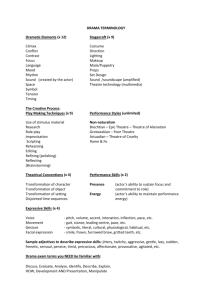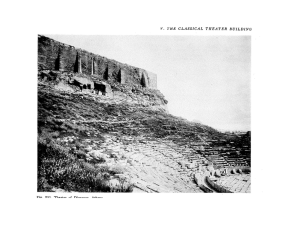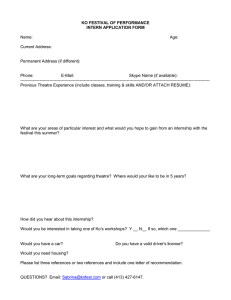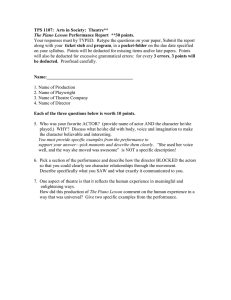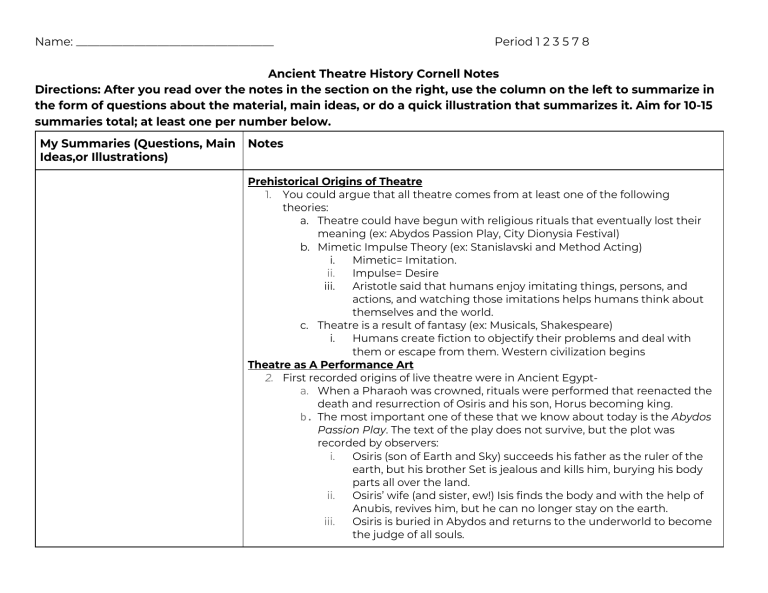
Name: __________________________________ Period 1 2 3 5 7 8 Ancient Theatre History Cornell Notes Directions: After you read over the notes in the section on the right, use the column on the left to summarize in the form of questions about the material, main ideas, or do a quick illustration that summarizes it. Aim for 10-15 summaries total; at least one per number below. My Summaries (Questions, Main Ideas,or Illustrations) Notes Prehistorical Origins of Theatre 1. You could argue that all theatre comes from at least one of the following theories: a. Theatre could have begun with religious rituals that eventually lost their meaning (ex: Abydos Passion Play, City Dionysia Festival) b. Mimetic Impulse Theory (ex: Stanislavski and Method Acting) i. Mimetic= Imitation. ii. Impulse= Desire iii. Aristotle said that humans enjoy imitating things, persons, and actions, and watching those imitations helps humans think about themselves and the world. c. Theatre is a result of fantasy (ex: Musicals, Shakespeare) i. Humans create fiction to objectify their problems and deal with them or escape from them. Western civilization begins Theatre as A Performance Art 2. First recorded origins of live theatre were in Ancient Egypta. When a Pharaoh was crowned, rituals were performed that reenacted the death and resurrection of Osiris and his son, Horus becoming king. b. The most important one of these that we know about today is the A bydos Passion Play. The text of the play does not survive, but the plot was recorded by observers: i. Osiris (son of Earth and Sky) succeeds his father as the ruler of the earth, but his brother Set is jealous and kills him, burying his body parts all over the land. ii. Osiris’ wife (and sister, ew!) Isis finds the body and with the help of Anubis, revives him, but he can no longer stay on the earth. iii. Osiris is buried in Abydos and returns to the underworld to become the judge of all souls. iv. Horus, his son, defeats Set, and becomes pharaoh. Greece: The Birthplace of Western Civilization 3. 508 BCE- Greece becomes the world’s first Democracy a. They had defeated Persian invaders and outlasted the Spartans, making Athens the main city in the Mediterranean for the next 100 years or so. b. Athens becomes the center of art, government, and culture. c. Becomes a very wealthy and powerful nation, building structures of cultural importance 4. Religion and Culturea. Greek gods were viewed as humanlike-- fallible, easily swayed, but also subject to Fate. Therefore, Greeks believed that Fate made all things uncertain. b. Greeks were also increasingly skeptical and questioning of religion and concerned with humanity. c. “Man is the measure of all things.” -Protagoras d. They believed that humans are amazing and complex, but the Fates still control the world, so they wrote t ragedies that remind people of life’s uncertainty. 5. Architecture a. Theatron- “Seeing Place”; space that could hold 14,000-17,000 spectators b. Orchestra- “Dancing Place”; performance space that was over 60 feed in diameter c. Parados- entrance/exit for actors and audience d. Skene- “hut” or “tent”; building with at least one door on it that served as a backstage area for performers, storage for needed items, and as a background for the performances 6. City Dionysia Festival (Athens) a. The First “Official” Theatre Event b. First recorded in 534 BCE c. This was a five day long, state-sponsored contest with a prize at the end for the best playwright (and later, best actor). d. Originally, the festival started out as a series of hymns performed by a chorus called d ithyrambs. Dithyrambs were songs and dances performed in honor of Dionysus, the god of fertility, wine and revelry. e. Things changed when an actor/writer named Thespis, the leader of his chorus, stepped away and gave himself a bigger part and played a character other than himself. Thespis is credited with being the first actor i. The Greek word for actor is hypokrites, meaning “interpreter” or answerer”. Thespis was “answering” and responding to the Chorus. 7. The First Playwrights a. For the City Dionysia contest, writers had to write three tragedies and one satyr play (a rude comedy about the gods that made the audience happy after the three tragedies). b. The ONLY surviving works are from “The Big Three”: i. Aeschylus- won the contest 13 times; ii. Known for adding a second actor in the tragic episodes iii. Sophocles- won the contest 24 times; writer of O edipus Trilogy; iv. Known for introducing a third actor in the tragedies, and also fixing the size of the chorus at 15. v. Euripides- won the contest 4 times but became more popular after his death; vi. Known for using controversial themes and topics, but he also made the dialogue and characterization more realistic. 8. Tragedy a. Origin and Definition: Comes from the word t ragoidia, which means “goat song,” because it was believed that goats were sacrificed at one point in the festival. b. Aristotle said tragedy should be i. “an imitation of an action that is serious, complete, and of a certain magnitude” ii. “with incidents arousing pity and fear, to accomplish its c atharsis of such emotions.” 1. Catharsis- Purging of emotion, usually in the form of crying or screaming, with clear thought as a result c. Structure and Plot i. Prologue- provided exposition/background ii. Parados- Chorus entered, further establishing the exposition and setting the mood. iii. 3-6 tragic episodes in which the main character learns of his fate iv. Exodus- Exit of the chorus d. All “action” is offstage- commonly a messenger character conveyed the bloody events e. Unity of time and place- The events of the play take place in one day and in one location. 9. The Greek Chorus a. a group of 12-15 male performers who provided several important functions: i. Interacted with the actors as characters ii. Gave advice, opinions, and asked questions of the other main characters iii. Established the moral definitions of the play iv. Reacted as an “ideal spectator” to whatever was happening with the actors v. Created a mood, and provided movement and spectacle that delighted the audience vi. Broke up the pace of the tragic episodes 10. Acting in Greek Tragedy a. No women were allowed on stage, so men played all of the roles. b. Actor training was focused almost completely on the voice, so it was more like training for an opera. The voices were loud, clear, and resonant, but not necessarily realistic. c. Movements were simple but broad to convey to a large audience. d. The actors wore large masks that suggested the character, as well as tunics and cloaks and platform shoes to make them look larger than life.

